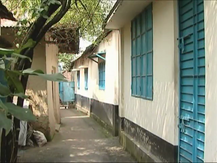This article has multiple issues. Please help improve it or discuss these issues on the talk page. (Learn how and when to remove these messages)
|
| Gobindachandra Das | |
|---|---|
 Poet by nature Gobindrachandra Das Poet by nature Gobindrachandra Das | |
| Born | Gobindachandra Das January 16, 1855 Dhaka District, Bengal Province, British India |
| Died | October 1, 1918 Dhaka, Bengal Province, British India |
| Occupation | poet |
| Children | 3 |
Gobindachandra Das (Bengali: গোবিন্দচন্দ্র দাস) (1855–1918), was a Bengali poet and writer.
Life

Das was born in Gazipur of Bengal province. He was a very poor man and could not continue study. He was an employee of the Bhawal Estate. He had two daughters and a son. The younger one was named Bhaktimoyi who later was married to Haripada Bhowmik and was the mother of three children. Her son was Dilip Bhowmik(1948-1998). In the last part of his life, Das was in very poor health.
Works

Gobindachandra Das was a ‘Swavabkobi’, ‘A poet by nature’.
His literary works were included in the curriculum of school level, secondary and higher secondary Bengali literature in Bangladesh.
Some works
- Kunkum
- Kastury
- Prem O Ful
- Boijointi
- Moger Muluk
References
- Bangla Sahitya (Bengali Literature), the national textbook of intermediate (college) level of Bangladesh published in 1996 by all educational boards.
- Das, Govindachandra at Banglapedia
External links
- Das, Govindachandra at Banglapedia
- Gobindachandra Das at the West Bengal Public Library Network